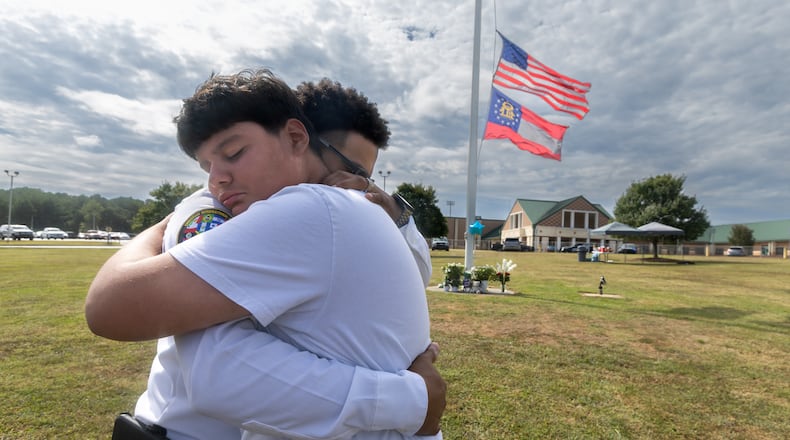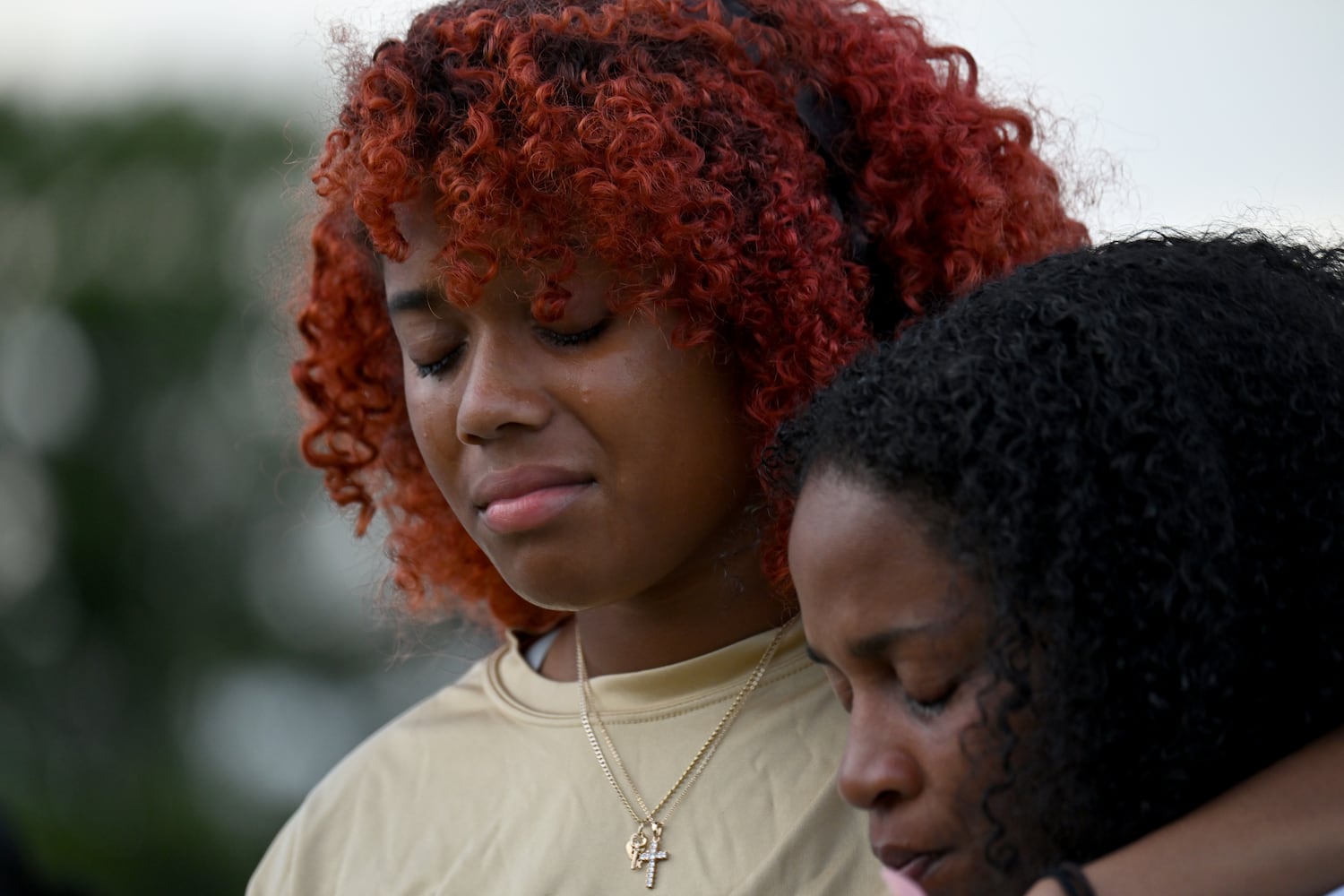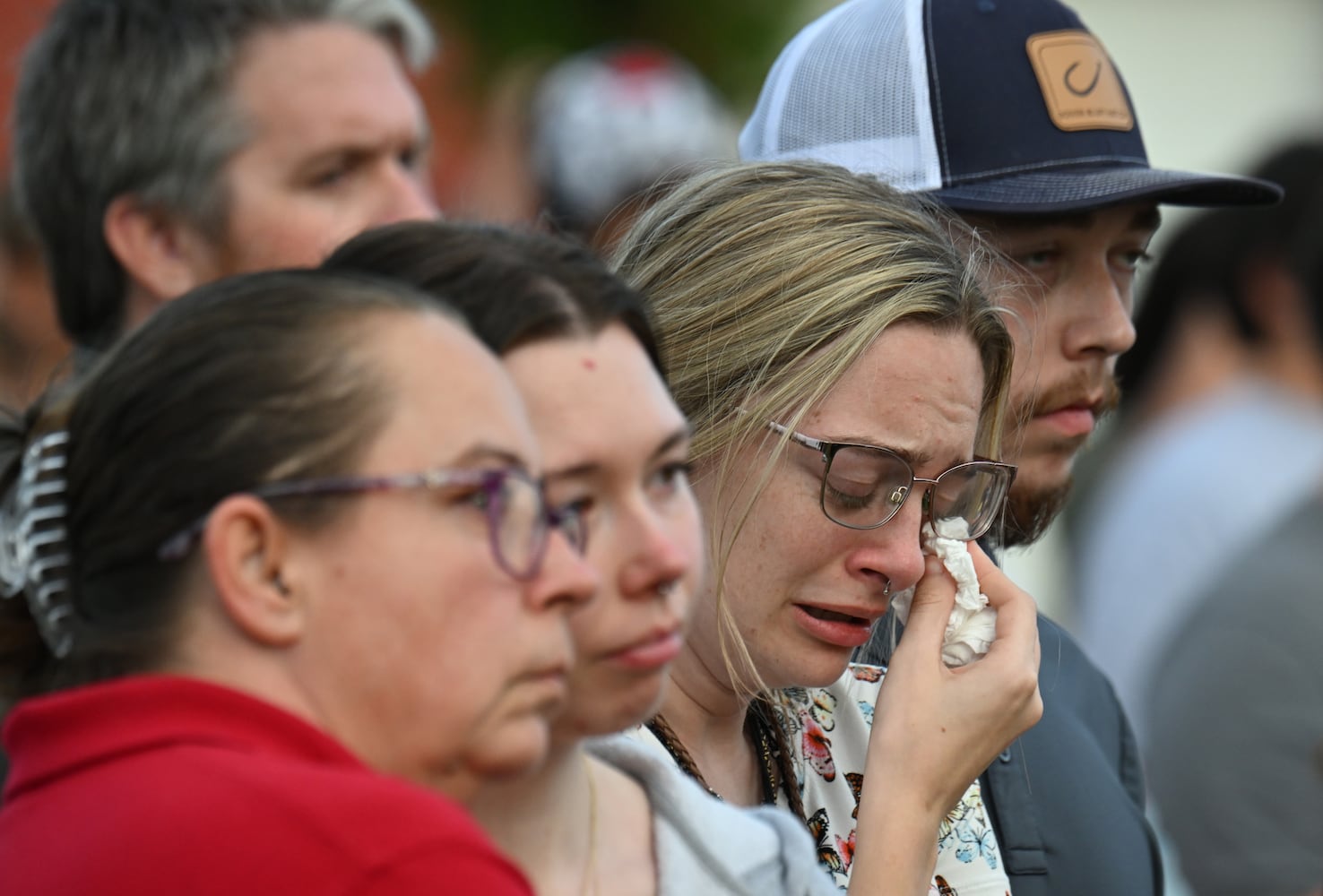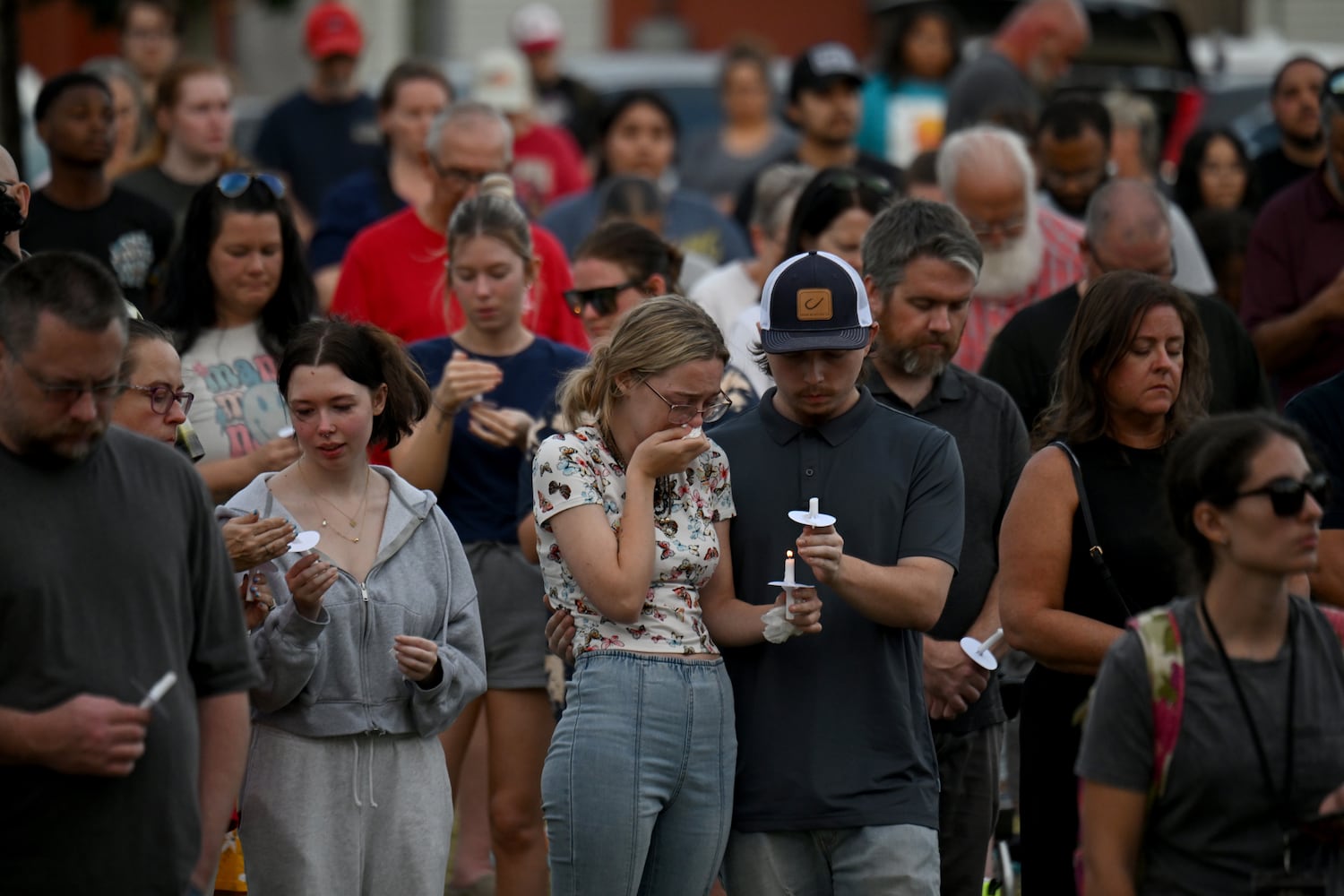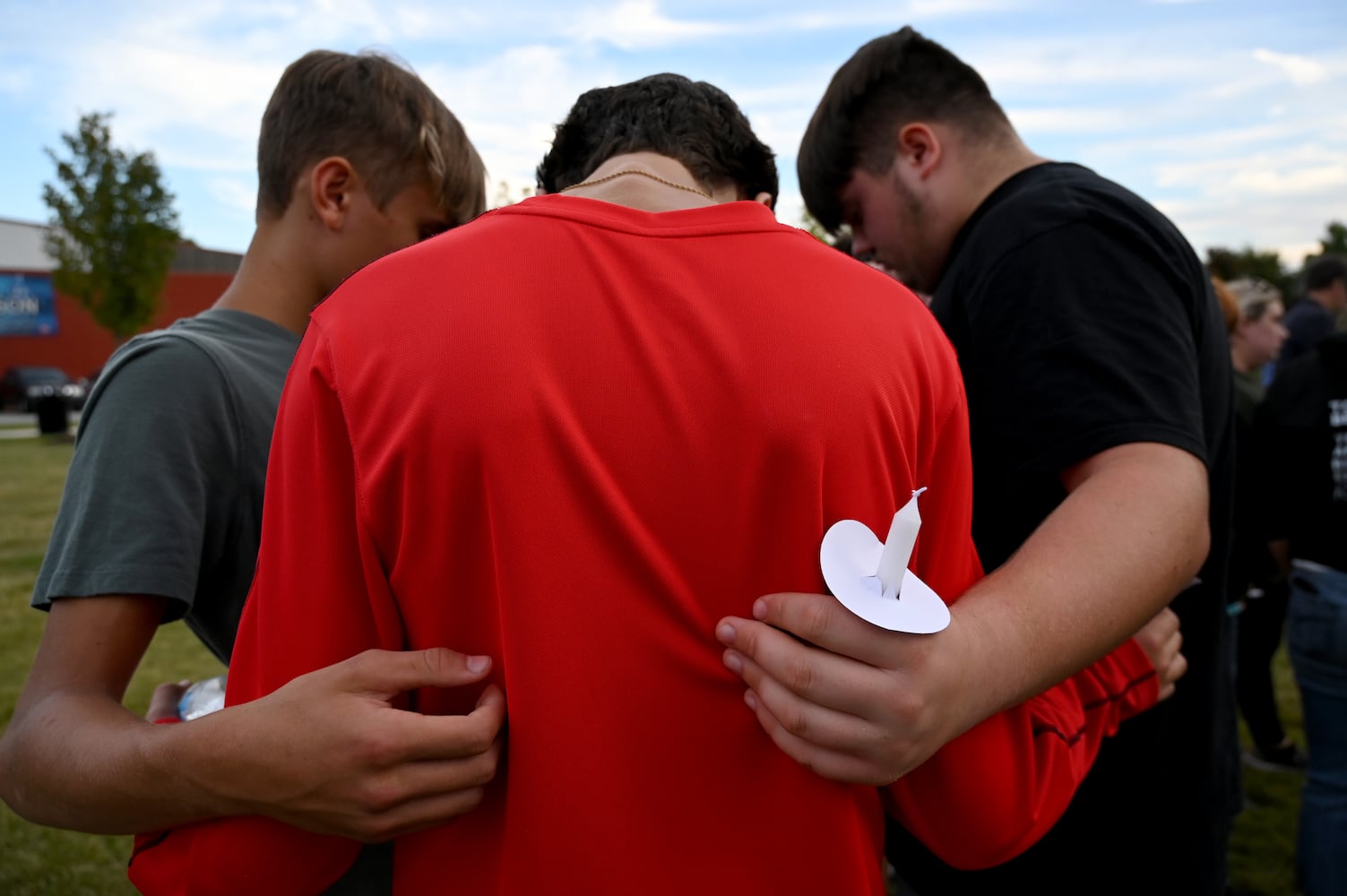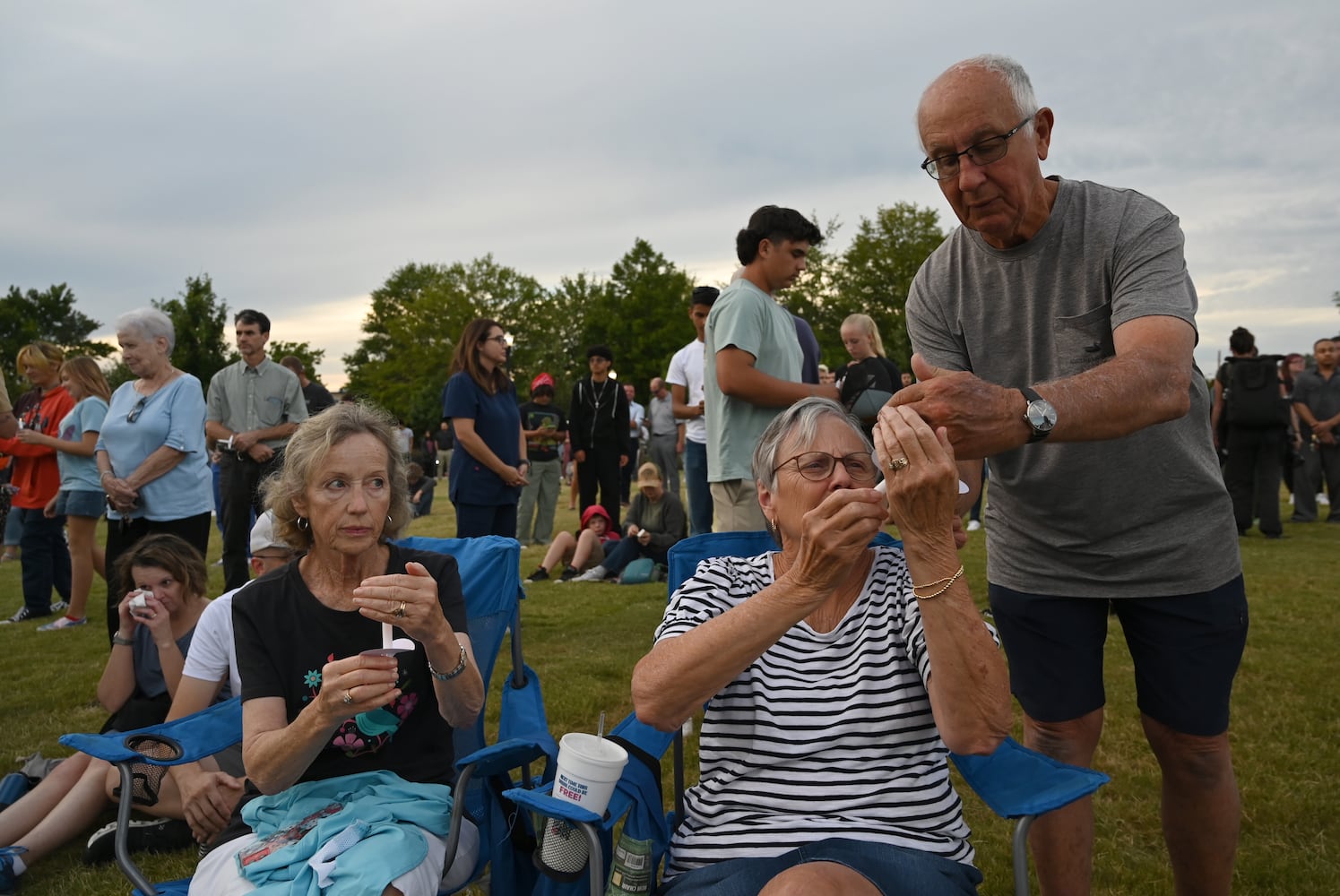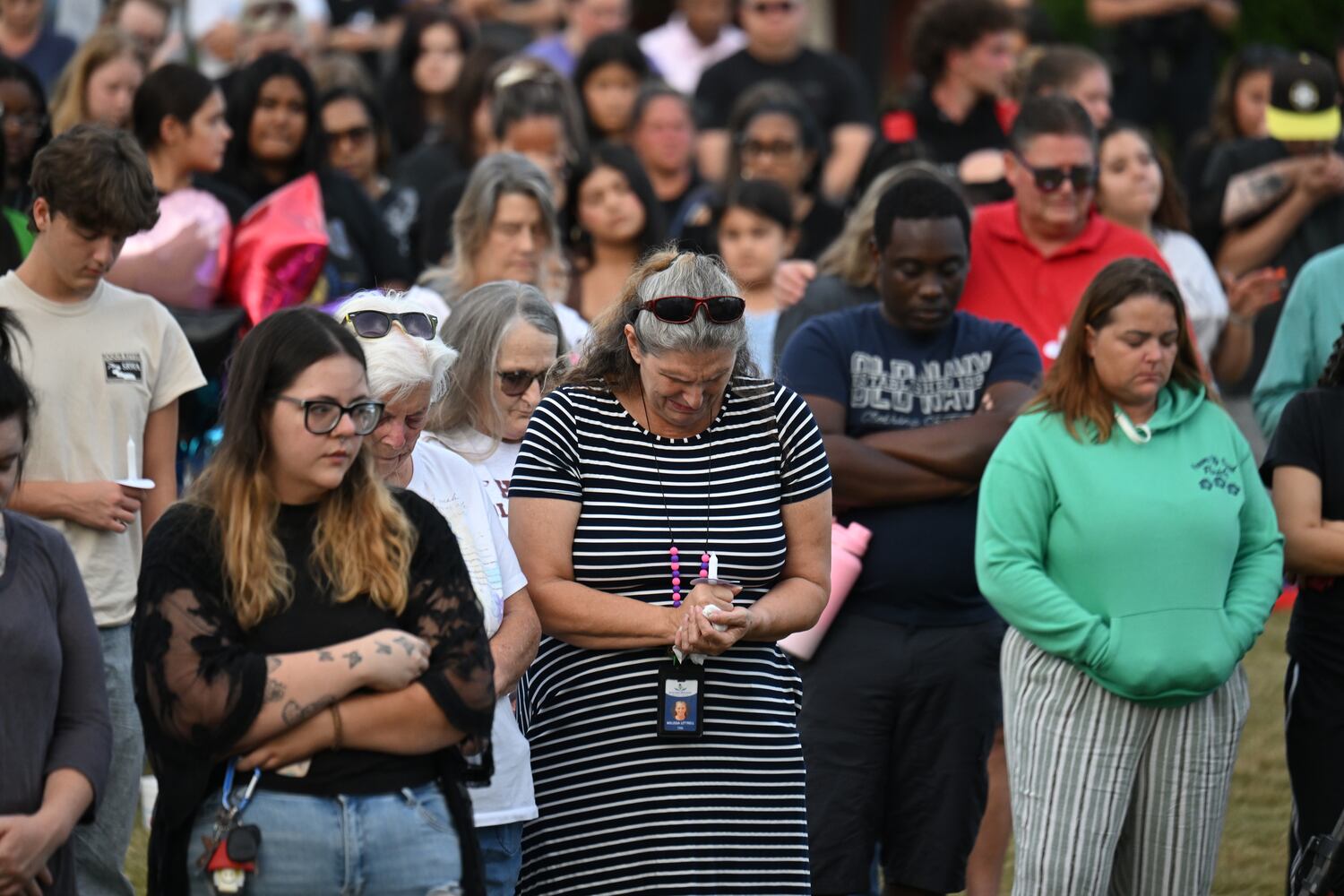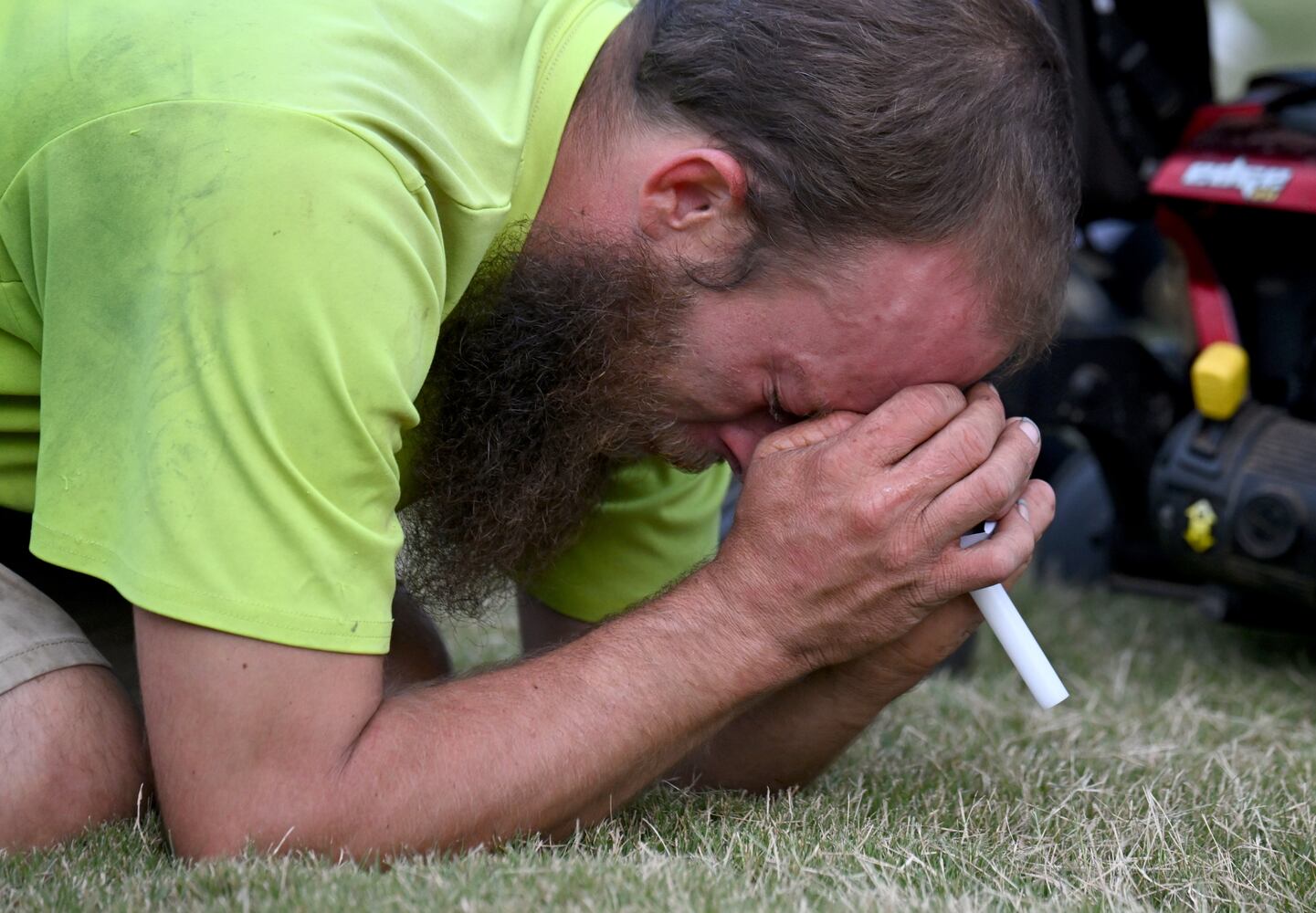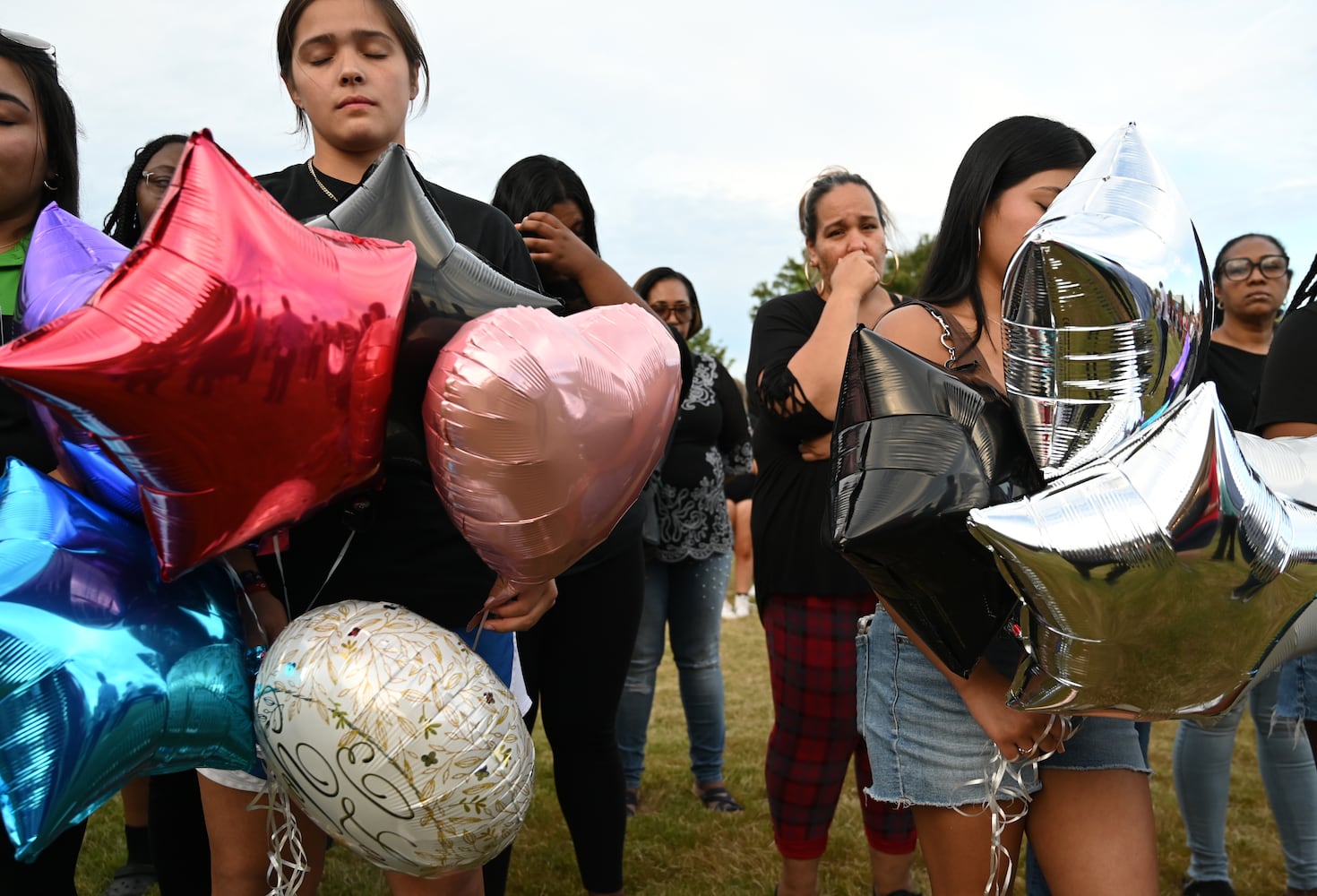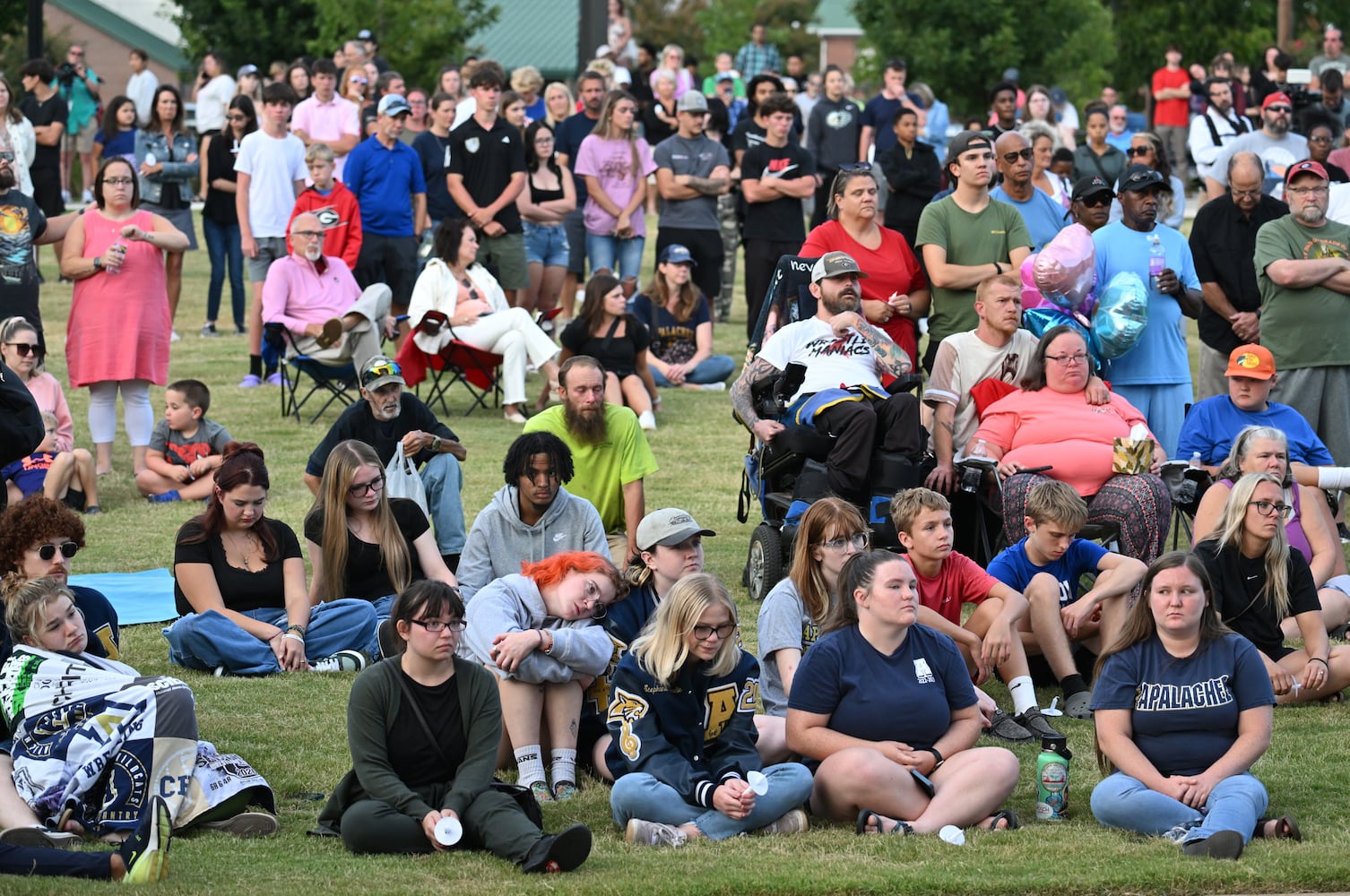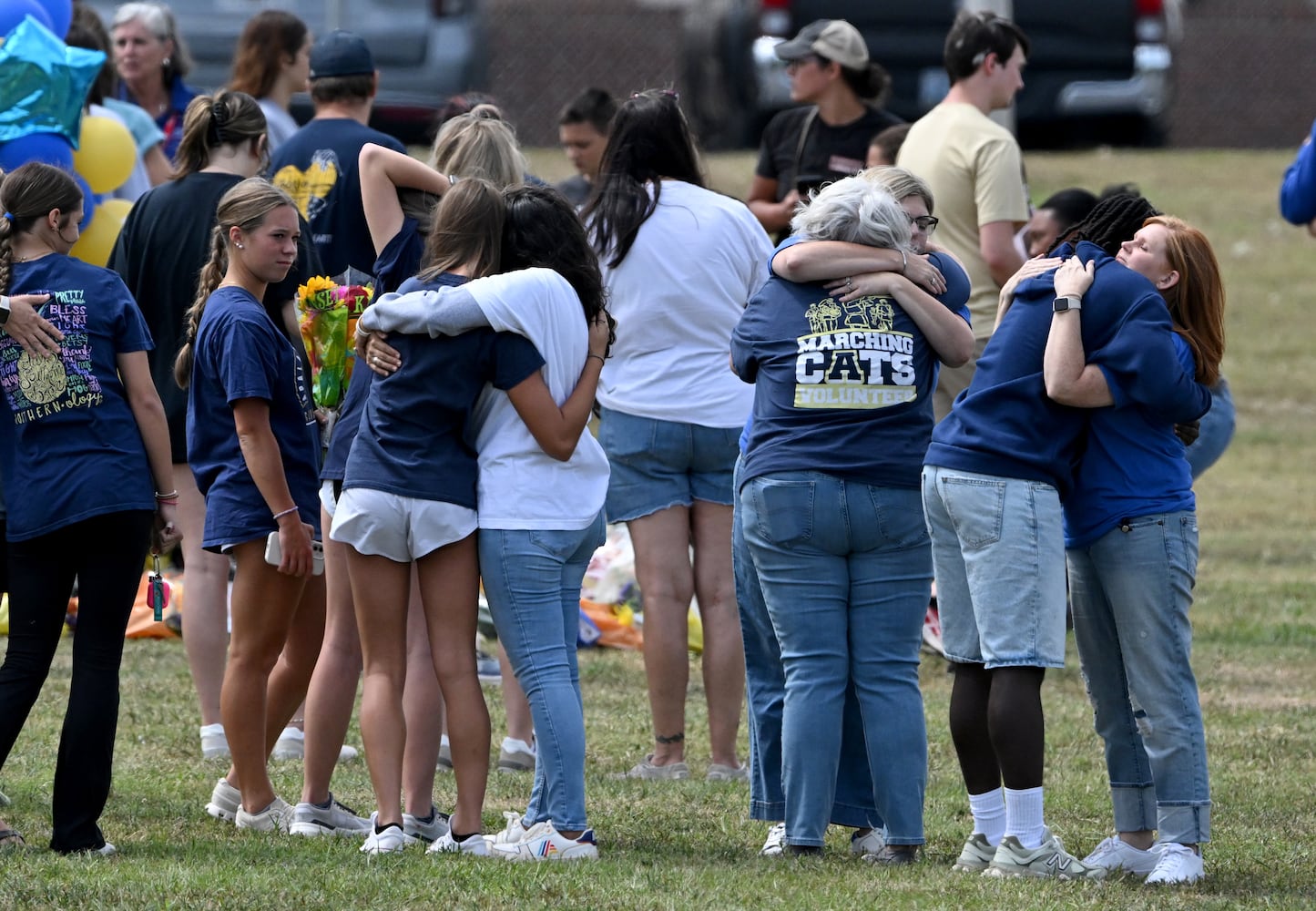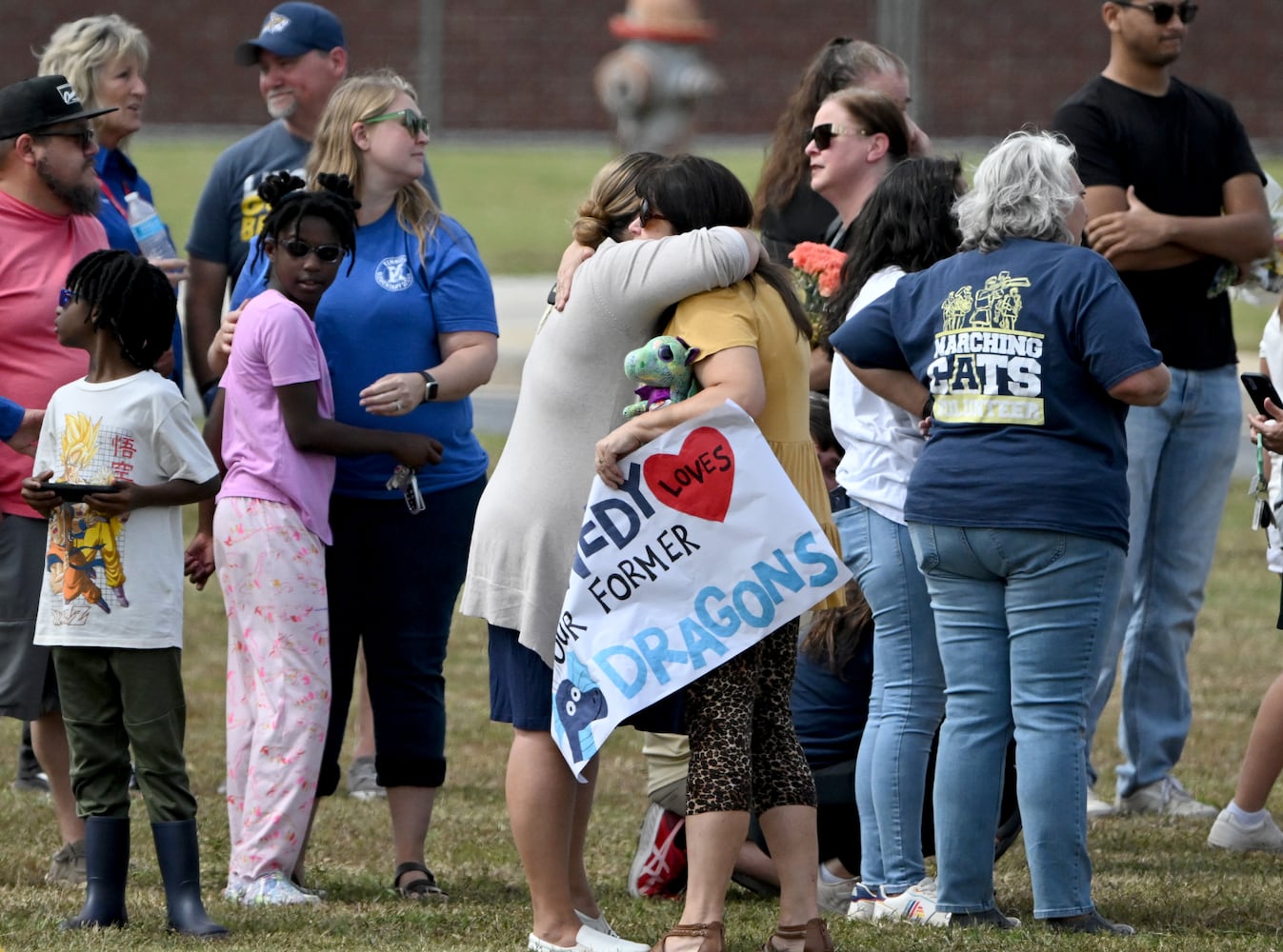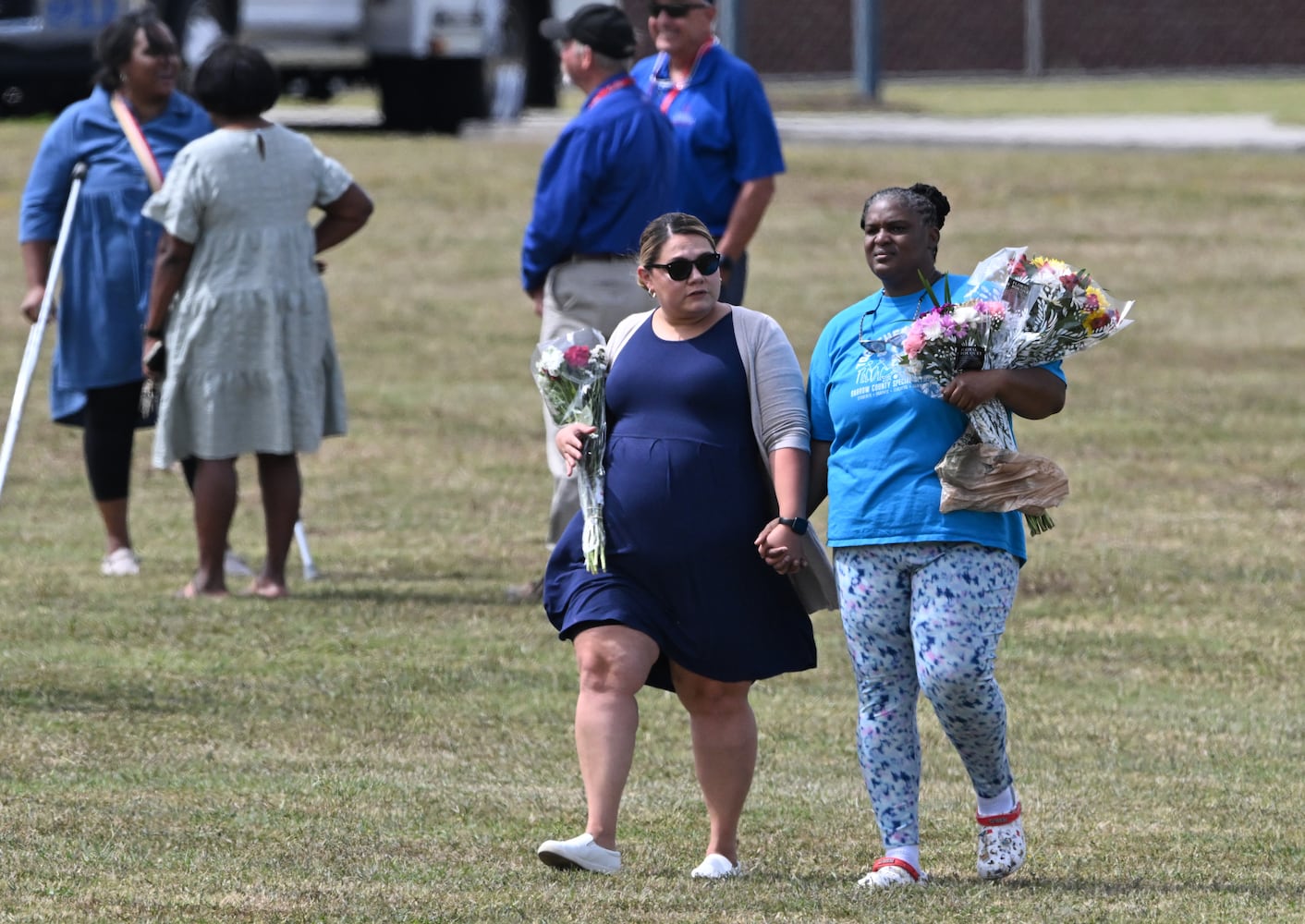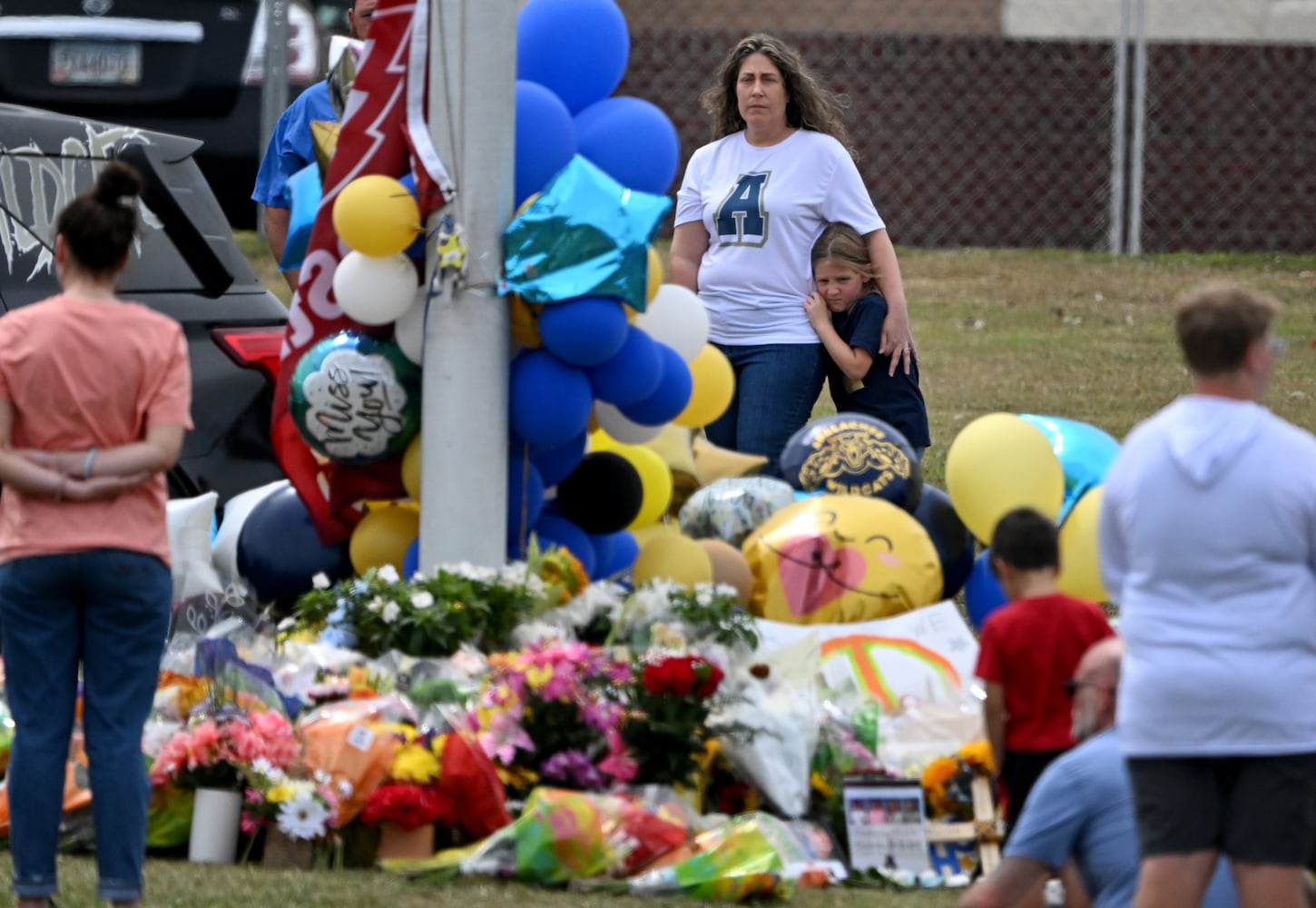(Editor’s note: This article is based on the reporting of more than 20 Atlanta Journal-Constitution journalists.)
This time it happened on a campus here.
On Georgia soil.
On the 23rd day of the school year at Apalachee High.
On the southwest side of the city of Winder — 37.1 miles east-northeast across Stone Mountain from the grounds of our state capitol.
This time, wishful thinking, hopeful sighs of, “Thank goodness it didn’t happen here,” rang hollow and useless.
This time, the rifle blasts hit home, and when they did an 11th-grader at Apalachee High, a girl named Lexi Gravitt, huddled in a classroom.
She did what anyone these days might do in a flash moment of life-threatened panic.
She tapped out a text message to her mother: “I think someone is shooting in the hall.”
It was 10:23 a.m. Wednesday. Second period. Someone was shooting.
Two students and a pair of math teachers lay dead. Nine more people, eight students and a teacher, were injured.
* * * *
Wednesday’s violence was over in a matter of minutes. For the victims’ families, it will last forever.
More than 72 hours later, grieving students, parents and teachers are still trying to grasp what happened and why. Investigators continue piecing together details in hopes of unearthing a clearer picture of what might have compelled the 14-year-old boy allegedly responsible for the massacre to open fire. The boy’s father also has been jailed.
In the wake of the bloodshed, the deadliest in state history, Barrow County’s schools closed for the week. This weekend, worshippers across the region will congregate in churches to pay their respects and to reflect. The district has yet to say when Apalachee High School will reopen.
There, too, is another question that remains unanswered: Will anything change when it comes to protecting students from gun violence? Mass shootings at schools are not common, but most everyone agrees they happen too often.
Apalachee is the deadliest school shooting in the state’s history, and the deadliest at a K-12 school in the United States since March of last year, when six people were killed at The Covenant School in Nashville, Tenn.
Apalachee marks the third gunfire episode at a Georgia school this year, but the first to happen inside a school.
Credit: HYOSUB SHIN / AJC
Credit: HYOSUB SHIN / AJC
* * * *
The Apalachee campus sits half a mile below Ga. 316.
The four-lane highway is a main artery linking metro Atlanta and Athens. Situated on Winder’s southwest side in what was once rural countryside, the school isn’t far from Fort Yargo State Park and a cluster of retail establishments that include a Chick-fil-A, an IHOP, a Target and a Home Depot.
It lies 23.5 miles due west of the heart of the University of Georgia, an institution whose prominent chancellor in the first quarter of the 20th century, David Crenshaw Barrow Jr., was the namesake for Barrow County itself.
The Apalachee River meanders less than a mile from the school. The waterway takes its name from what is believed to be the oldest-known, native-tribal name in the state. The word “Apalachee,” historians have suggested, may be a derivation of the Choctaw apelachi, meaning “allies” or “helpers.”
Apalachee High houses roughly 1,900 students. It opened in 2000, and sits next to an elementary school and a middle school.
****
On Wednesday morning, dawn broke on what would be Winder’s coolest day since early June. Skies were sunny.
In Apalachee High’s classrooms, students were settling in on their second day back from a four-day Labor Day break.
Then, two hours into the school day, chaos. Whiteboard screens in the rooms flashed an emergency warning: “Lockdown.”
What was unfolding wasn’t immediately clear.
A student, 17-year-old Jasmine Johnson, texted her mother: “We’re on hard lockdown and people are banging on lockers.”
But the bangs were gunfire.
It was about 10:20 a.m.
Police were alerted.
A few minutes ticked by.
Lexi Gravitt’s mother tried to call her.
“Stop,” the high school junior texted back, as if to whisper. “I can’t answer.”
“Do I need to come,” her mother typed, “are u ok.”
Lexi replied with three words, words that, amid such unknown fury, would make any parent’s heart sink.
“I love you,” the teen wrote.
Student Zyrianna Finch, a junior, had heard a rapid series of gunshots. “Then my teacher told us to get in the closet,” she said, “so we all got in the closet.”
Another junior, Micah Hartsock, texted his father as he took cover behind a table: “There’s a shooter.”
Around that time, Lexi again messaged her mother, who had said she was on her way to the campus: “Stay away.”
In the commotion, a female student in another class heard gunshots. Then she saw a teacher’s body. The girl would later tell a family friend that the teacher had stepped into a hall to see what was going on.
The teacher was shot.
Another student sprang to action.
“He pulled the teacher’s body in the room, closed the door, and then he took his shirt off and covered the teacher’s face,” the family friend told a reporter. “And then he started putting desks in front of the door. ... He basically saved them.”
Back in Lexi’s classroom, she and fellow students were hiding. The shots seemed to have stopped. But she couldn’t be sure.
“They are by our class,” she again texted her mother, before adding, “I love you so much mama.”
“I love u Lexi,” her mother replied.
Four people lay dead: 14-year-old students Mason Schermerhorn and Christian Angulo; math teacher and assistant football coach Richard Aspinwall, 39; and math teacher Cristina Irimie, 53.
Seven others, one adult and six students, were struck by bullets. Two more youths were injured.
The shooter was apprehended at 10:26 a.m.
A school resource officer confronted him and, according to Barrow Sheriff Jud Smith, the alleged shooter, himself a freshman at the school, said to be armed with a semi-automatic AR-15-style rifle, quickly surrendered.
Credit: John Spink
Credit: John Spink
****
The violence that had unfolded in the moments before was horrific. And it could have been worse. Like in Uvalde, Texas, where an 18-year-old former student killed 21 people at Robb Elementary School. Or in Parkland, Florida, where a 19-year-old shooter gunned down 17 at Marjory Stoneman Douglas High School. Or at Sandy Hook Elementary School in Newtown, Connecticut, where 26 were slain by a 20-year-old killer.
At Apalachee High, staffers had for a week or so been wearing Centegix badges that can, with a few button clicks, swiftly alert fellow faculty and first responders about emergencies. On Wednesday, the badges were credited with helping sound the alarms.
Students also texted by cellphone. Cellphones are a distraction in classrooms, and some schools in Georgia and elsewhere have begun restricting their access during teaching hours. Apalachee High doesn’t have such restrictions. During an emergency, like on Wednesday, that is a good thing.
****
As the Apalachee classrooms were cleared by the police, students filed into hallways, arms up, to signal they were not themselves threats, and were guided to the school’s football field.
Parents rushed from work and home to learn whether their children were safe. As police swarmed the campus and their cars clogged the roadways, some mothers and fathers of students parked as much as a mile away.
Lexi, the high school junior, then safely at the football stadium, continued to message her mother.
“I’m freaking out, mama,” she wrote. “I’m so scared.”
Her mother arrived on campus and messaged back: “I know baby I’m here.”
She tried to get closer. “Look on the other side of the football field ... behind the bleachers.”
Parents and students were only starting to come to grips with what had happened.
Freshman Jayden Finch would recall seeing “a body” as he and his classmates walked out of the school.
”There was a threat to the school this morning, but there are so many empty threats, they didn’t take it seriously,” said Jayden.
Sophomore Alexsandra Romero thought it was a drill, until it wasn’t.
“I can still picture everything, like the blood, the shouting and everything,” Alexsandra said afterward.
Employees at a senior living facility across the street from the high school set up a refreshment stand for families and law enforcement.
****
That night, at a vigil in Winder’s Jug Tavern Park, about 300 people gathered.
The Rev. Geoffrey Murphy of Winder First United Methodist Church prayed for the victims, their families and the town.
“Today,” Murphy said, “has been a terrible day of evil, a day where evil has reared its head and brought casualty into our world.”
Earlier in the day, Gov. Brian Kemp had been in Nevada where he had been scheduled to speak, but he quickly flew back to Georgia. He pledged all available state resources to help investigators. He also appeared alongside the Barrow sheriff and the GBI’s director late Wednesday.
“This,” Kemp told reporters, “is everybody’s worst nightmare.”
President Joe Biden, in a statement, said, “What should have been a joyous back-to-school season in Winder, Georgia, has now turned into another horrific reminder of how gun violence continues to tear our communities apart. Students across the country are learning how to duck and cover instead of how to read and write. We cannot continue to accept this as normal.”
****
Credit: Courtesy photos
Credit: Courtesy photos
Remembrances of the victims began emerging in the wake of the killings.
The slain included two math teachers.
Richard Aspinwall, 39, also the football team’s defensive coordinator, was known as “Coach A.”
He was described by co-workers as an “intense coach,” one who “lived football.”
He swept the Wildcats’ locker room. He did their laundry. He emptied the trash.
“Nothing,” head coach Mike Hancock recalled, “was beneath him.”
No matter the game’s outcome, Aspinwall always found and embraced his wife, Shayna, and their two young daughters after every game in the back of the end zone.
Teacher Cristina Irimie was fond of dancing.
Irimie, 53, was a native of Romania.
She taught math to English-language learners.
She also enjoyed cooking. She volunteered at church.
Her pastor said she “had a gift” for teaching.
A friend and colleague, Jordan Rushing, described her as “a firecracker,” who was “always very joyful, always happy,” always trying to cheer up others.
One of the students who was killed, Mason Schermerhorn, was remembered by a friend as “the sweetest, most loving soul with the biggest smile.”
The other student who died, Christian Angulo, was “very sweet and so caring,” relatives said.
His sister, Lisette Angulo, said, “He was so loved by many ... (and) didn’t deserve this.”
The Apalachee football team’s home game that had been scheduled for Friday against Monroe Area was canceled. Wildcats players and coaches convened Thursday afternoon at Bethlehem Church, about 5 miles from their school.
****
In the hours after the shootings, flower bouquets were left by mourners in Jug Tavern Park. One of them, Cecil Odoury, stood with her 10-year-old son and said a prayer for “the departed souls.”
She had envisioned her children being safe when their family moved to the U.S. years ago from Kenya.
“But now my heart is in pain,” Odoury said. “I can’t sleep. I’m traumatized thinking about my kids are (at) risk going to school.”
About 6 miles from the school, a sign outside Ann’s Flower & Gift Shop in Winder bore the messages “Love will prevail” and “Barrow Strong.”
Speaking through tears, Paige Stinchcomb, who runs the shop and who didn’t know any of the victims, said she had to do something to honor them. She is selling bows in Apalachee school colors, navy and gold. Proceeds will go to victims’ families.
“Even if I didn’t know any people that were affected,” Stinchcomb said, “it has affected the whole community.”
GoFundMe fundraisers collected more than $626,000 for the victims, with Aspinwall’s fundraiser alone raising more than $300,000, as of Friday morning. A separate fund created by the families of previous school shooting victims had raised an additional $14,000.
****
Glimpses into the alleged shooter’s background and home life have begun to surface.
In May of last year, the FBI’s National Threat Operations Center received several anonymous tips about online threats to commit a school shooting, threats that they traced to Gray.
The FBI passed the 2023 alert to the Jackson County Sheriff’s Office, who sent a deputy and an investigator to Gray’s home in Jefferson to interview him. Gray, who was 13 at the time, was there with his father, Colin Gray, when the officers spoke to them. The teen denied making the threat.
Sheriff’s investigator Daniel Miller Jr. gave the youth a word of advice: High school is what really counts.
“The last four years is what matters,” Miller told him. “Get them good grades, man. It will set you up for the rest of your life.”
The matter was closed a couple of days later.
Late Wednesday, an FBI statement noted that Gray’s father “stated he had hunting guns in the house, but the (son) did not have unsupervised access to them.”
With the information investigators had at the time, there was no legal basis to pursue any charges, the FBI said. But the Jackson sheriff’s office was said to have alerted local schools, and Gray was monitored, the FBI added. What resulted from that monitoring has not been disclosed.
On Thursday night, the father was charged with multiple crimes including involuntary manslaughter in connection with the case.
****
Colt Gray made his first appearance in Barrow County Superior Court on Friday. Shackled and wearing a green jail uniform, he nodded silently as the judge explained the proceedings. The 14-year-old is being charged as an adult and faces four counts of felony murder.
Minutes later, Colin Gray, 54, was led into the same courtroom. He rocked back and forth and appeared to cry as the judge told him he could be sentenced to up to 180 years in prison for charges authorities say are “directly connected with the actions of his son” in the Apalachee massacre.
The case against the elder Gray parallels one from earlier this year in Pontiac, Michigan, where the first parents convicted in a mass school shooting in America were sentenced to at least 10 years in prison. The judge in that case pointed to what he said were James and Jennifer Crumbley’s missed opportunities to prevent their teenage son from possessing a gun and killing four students three years ago. The couple was convicted of involuntary manslaughter.
Colt Gray’s parents have lived separately for years, with Colt living with his father.
Court records show that Colt Gray’s mother, Marcee Gray, has a criminal record spanning more than 17 years. The 43-year-old has faced prosecution in Barrow, Fulton and Forsyth counties, accused of domestic violence, drug possession, property damage and traffic violations.
She also has faced civil fraud claims related to a vehicle purchase and was in jail in South Georgia’s Ben Hill County as recently as April, according to publicly available court filings.
****
As raindrops fell from the sky on Friday, hundreds of people gathered again for a vigil in Winder.
“We shouldn’t be here for this,” said Tresa Dudley, who has lived in Winder her whole life. “We should be up there watching them play football right now.”
The shooting was the third at a Georgia school this year. The two earlier shootings in Powder Springs and Atlanta happened in school parking lots.
Before Wednesday, 18 people had died by gun violence on the property of Georgia K-12 schools. That includes shootings outside of school hours, but not shooters or those who died by suicide.
There have been 82 school shootings in Georgia since 1975 — 41 of them during school hours, according to an Atlanta Journal-Constitution analysis of data from the Center for Homeland Defense and Security, Washington Post data and AJC archives.
****
For survivors, the toll is far-reaching and lasting.
“Our world view is: I get up, send my child to school, and they come home — or I send my spouse, who is a teacher, to school, and they come home,” said Robin Gurwitch, a clinical psychologist at Duke University Medical Center and a member of the National Child Traumatic Stress Network. “When something like this happens, it fundamentally turns our perception of the world upside down.”
Gurwitch said support can come in different ways. People have different needs. And there are no easy answers. “You can’t turn to chapter five for ‘What do I do after a mass shooting at my kid’s school?”
For children who say they don’t feel safe going back to school, it’s important to not invalidate their feelings, but to talk and listen, she said.
In a 2018 survey conducted by the Harris Poll for the American Psychological Association, 72% of young people between ages 15 and 21 said that school shootings — or the possibility of a shooting — were significant sources of stress for them.
April Johnson, the mother of Apalachee junior Jasmine Johnson, who first mistook the gunshots as someone banging on lockers, no longer feels safe sending her two children to school.
“It’s not going to be the same when we come back. What if somebody hits a locker and it spooks (Jasmine)? She’s got real bad anxiety, so if someone bangs a locker, she’s going to think someone’s shooting again,” the mother said.
Winder-area religious leaders from a dozen or so churches have been offering help to those in need.
The Rev. Chris Strickland, an assistant pastor at Winder First United Methodist Church, said he had received calls from as far away as Texas from people “praying to lift us up.”
Said Strickland, “I’m not a ‘thoughts and prayers’ guy. But I am asking, ‘How do I turn my rage into an action that builds community, including love for the aggressor?’”
Bethlehem First United Methodist Church has planned a 5 p.m. prayer service for Sunday. Grief counselors will attend.
That spirit of love is what led Chaplain Al New of the Power Point Ministries in Kingsport, Tennessee, to make the nearly four-hour drive to Winder. New is the Billy Graham Rapid Response chaplain coordinator on the ground, and spent much of the day Thursday at the school in Winder.
“Law enforcement has the school fenced off,” New said. “But outside the school at the flagpole, people are laying flowers. Most of the people here right now are media from around the country. But family members are showing up with flowers.”
On Sunday, many will show up at church.
Healing will come slowly.
First there will be funerals.
- AJC journalists who contributed reporting to this article include, in alphabetical order, Shaddi Abusaid; Cassidy Alexander; Lexi Baker; Michelle Baruchman; Greg Bluestein; Riley Bunch; Taylor Croft; Martha Dalton; Sara Gregory; Henri Hollis; Rosana Hughes; Joe Kovac Jr.; Katherine Landergan; Vanessa McCray; Charles Minshew; Tia Mitchell; Thad Moore; Helena Oliviero; Fletcher Page; Jozsef Papp; Alia Pharr; Jeremy Redmon; Michael Scaturro; Caroline Silva; and Alexis Stevens.
About the Author
Keep Reading
The Latest
Featured
